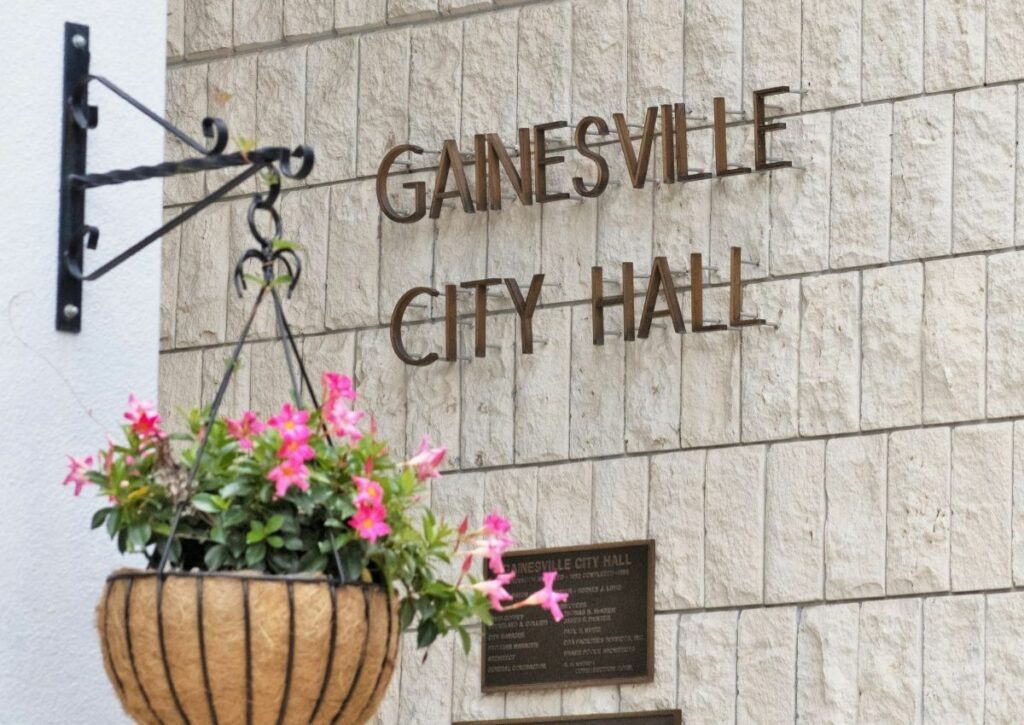
The Gainesville City Commission will redo its first and second votes to place a ballot initiative on the November ballot that would eliminate the City Charter section that created the Gainesville Regional Utilities (GRU) Authority.
HB 1645, which the Legislature passed and Gov. Ron DeSantis signed last year, created Section 7 of the City Charter, which established the authority to manage the utility. Without it, GRU control would revert to the City Commission.
The new first reading vote will happen at Thursday’s regular meeting.
Also on the meeting agenda, the city will consider appointments to its new downtown advisory board, amendments to its code regulating single room occupancy residences, a resolution urging the UF Board of Trustees to keep P.K. Yonge’s admission process untouched.
Commissioners will also accept a mid-year report projecting a $5.1 million surplus by the end of the fiscal year.
The commission voted unanimously on May 16 and May 23 to move forward with the ballot initiative. Both votes happened before the new GRU Authority was installed, but the new board members addressed the issue at its first meeting on May 29.
The GRU Authority called the ballot initiative illegal and directed its attorney to notify the Supervisor of Elections.
According to backup documents, the Gainesville City Commission must redo the two votes because the original items lacked a business impact estimate, a new state requirement.
“The City of Gainesville is, nevertheless, providing this Business Impact Estimate as a courtesy and to avoid any procedural issues that could impact the enactment of the proposed ordinance,” the backup document says.
The city states that there is no direct business impact on private, for-profit business from the ordinance, which will create the ballot initiative. The document also says that no businesses will likely be impacted by the ordinance.
While not directly impacting businesses, GRU’s financial advisers warn that a successful ballot initiative could be met with immediate action by the bond rating agencies. If that immediate action is a credit downgrade, the advisers estimate the economic impact to GRU at $28 million.
Other items
Gainesville staff are recommending the City Commission eliminate four requirements from the city’s single room occupancy residences, like hostels, rooming houses or dorms.
If approved, these single room occupancy residences could be built within 1,000 feet of each other and wouldn’t need to be located within a quarter mile of public transit. The changes would also eliminate the requirement that these residences provide laundry facilities.
Lastly, these residences would no longer need to have a manager’s office on site.
Staff aim to simplify the building process for this type of development and hope that the smaller square footage associated with these residences will allow lower rents and an easier return on investment for developers. Plus, the higher density from these units would reduce pressure for urban sprawl, according to backup documents.
In the consent agenda, the city’s office of management and budget provided its update for the second quarter, ending March 31. The report shows that the city expects a $5.1 million surplus by the end of the fiscal year compared to the adopted budget.
Steve Varvel, director of the office, said the surplus has mostly come from personnel savings and using less overtime than expected.
“The first six months of any fiscal year are not a definitive indication of the experience for the remainder of the fiscal year, but do however, provide a better glance at identifying any potential issues compared to the first quarter of any fiscal year,” Varvel said in the report.
Also in the consent agenda, city staff recommend a policy change to require city employees traveling for business or training to use the Gainesville Regional Airport instead of other air travel options.
The recommendation said that travel from the Gainesville airport would be less expensive when considering “driving time, mileage, parking, tolls and safety risks.”
The Gainesville City Commission will also vote to approve half a million dollars for a local design firm, CHW Consultants, to create different development scenarios for the Eighth Avenue and Waldo Road project (renovating Citizens Field, the MLK Jr. Multipurpose Complex and other facilities on the site).
The project has been championed by Commissioner Cynthia Chestnut since she returned to the City Commission.
Chestnut also made a resolution asking the UF Board of Trustees not to change the admission process for P.K. Yonge Developmental Research School. The board has considered switching to selective admissions, prompting concerns from many staff, parents and alumni.
The resolution asks the board to allow the school “to continue advancing its mission of taking diverse students and families and building communities with shared values.”
That resolution will go before the City Commission on Thursday.


I have yet to hear why GRU thinks the ballot initiative is ‘illegal’. Where in state law does it say the City can’t amend its charter?
Section 7 was specifically removed by the governor.
The GRU Authority’s attorney spoke to their issues with the ballot initiative at the May 17 vote. We describe their position in the article linked below.
https://www.mainstreetdailynews.com/govt-politics/gainesville-ballot-initiative-gru-authority
Will GRU customers outside the city limits be allowed to vote on the initiative if it’s on the the November ballot, or will it be a straw ballot where only city residents are allowed to vote like the last time?
from what i have seen it’ll be City Residents only again. 🙁